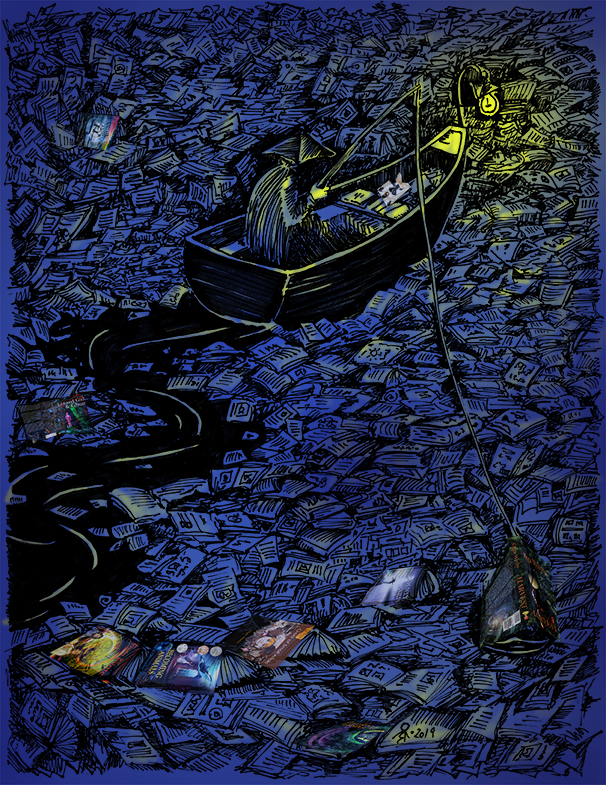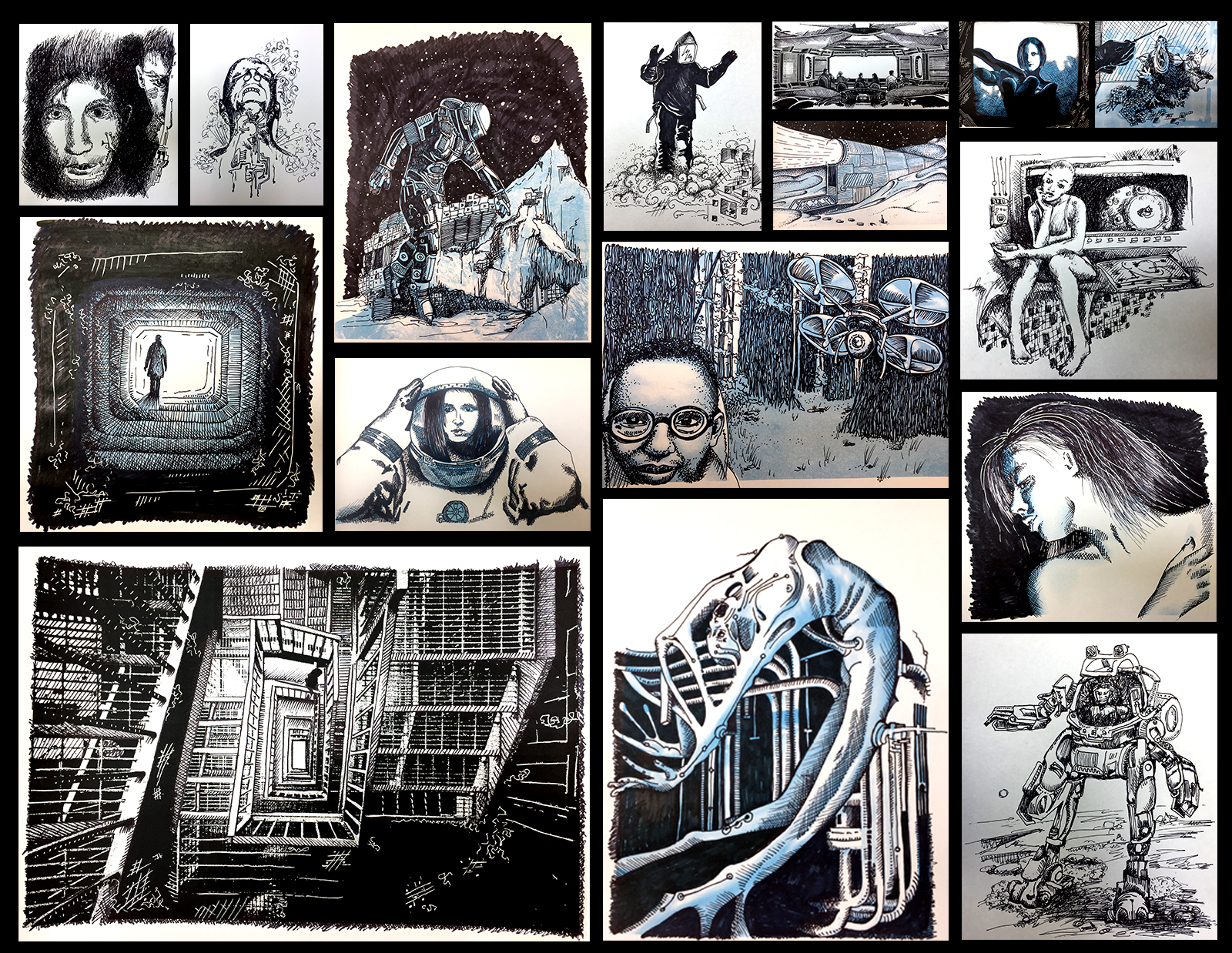
Societies continuously try to recreate themselves — shared holidays, shared news, shared traditions, shared language, shared music, shared myths, shared victories, and shared griefs. Shared origins… So by telling each other stories, we recreate ourselves over and over again. Where do we come from? Where are we going? Who are our heroes? Who are the villains? These stories pass our values as a society from one generation to the next. It’s how we understand each other. “Rosebud.” There was a time where everyone in America knew exactly what that reference was. Now? Nope. “Remember the Alamo!” People still know the phrase, but its meaning — the short cut to meaning that this phrase used to represent — is no longer widely available.
Cultural propagation used to be easy when everyone knew everyone else in the small village they all lived. Strangers were either killed or assimilated. People easily recognized “their own.” Sometimes, it was as simple as the way you’d pronounce a word. Such cultural distinctions to divide between “us” and them” are called Shibboleth. Do you drop your p’s or roll your r’s? Do you wear “snickers” or “runners” or “trainers”? Is it “herbs” with an “h” or without? Shibboleth is a simple way to finger someone who doesn’t belong, a way to catch a spy. During WWII, there were handbooks with words that “spies” tended to mispronounce… As I’ve written before, people are great at taking small differences and inflating them to create arbitrary cultural rifts. How else can we identify “the bad guys”?
For many millennia, reading the Bible and going to services created shared understandings. Even now, Synagogues read the Torah cover to cover over a period of a few years and then start over again. This cycle allows the members of a congregation to create a shared meaning of religious passages, ensuring that they stay anchored in the present discourse. Schools, being mandatory up to a certain age, enculturate its pupils with history lessons and by reading the same books that their parents used to read (and their parents before them). When I grew up, everyone read “Peter Pan.” Everyone read “Ivanhoe” and “Captain Blood.” Everyone read (and memorized) “Eugene Onegin.” The generation of my kids all watched every Disney movie ever made! And all of the other cartoon movies. “Yep yep yep!” All this formed a shared foundation for interpreting new information — life and history as it was unfolding all around us.
But there is a discontinuity now — the latest generation no longer consumes media (books and videos and other cultural outputs) the same way we did. There are memes, but they are culturally segmented and arrive at such a breakneck speed that they no longer serve a function of unifying the whole of society. Memes breakdown the population into ever more diverse groupings. There are those who watched all of “Breaking Bad” and those who didn’t and thus won’t get the cultural references based on that show. But meme-based group understandings are even more esoteric — did everyone watch that puppy that can spin plates? No? How about Jon Snow doing everyone’s makeup? No again? Now you are an outsider. There was a time when most everyone could say they watched all of the Starwars movies. Now? Even I can’t say it! While “to each, his own” is a true statement and all that, the cultural glue that used to work so well when everyone tuned into the latest episode of “I Love Lucy” is gone.
The media hose of our society’s creativity no longer uniformly soaks us in a shared culture. And there are obvious drawbacks to that. One is the extreme polarization of our political views — how can we find common ground if we don’t even share the same cultural foundations? We don’t even watch the same news or share the same “truths” anymore.
There are some projects that managed to break through: “Game of Thrones” and “Harry Potter” narratives transcended borders and cultural barriers and even linguistic and political divides. The late 1900’s and early 2000’s were the decades of Harry Potter. The last ten years or so were the years of GOT. Around the whole world, people can discuss their likes and dislikes of the strange plot twists and opine on what they would have done differently. But they all have these stories in common! The writers managed to manipulate billions (that’s with a B) of people into emotionally bonding with some characters and hating others. And this was done in a very short time frame. This is an unprecedented achievement in the history of mankind.
Writers have incredible power. We can shape the world’s narrative. We add to the social capital of civilization. …we just need to find our readers.
Big publishers used to make the decisions of who gets to be read and who didn’t. That’s no longer true for the most part. A single indie author has to get lucky to break through into the cultural discourse. That doesn’t happen without a few of the most fanatical fans. I was an early reader of Hugh Howey. I shouted from every rooftop (virtual and otherwise) of my discovery. He deserved it (perhaps not his early work or even his later work, but he is good and worth a read). Hugh had a spark of something interesting to say. And it caught fire. J.K. Rolling also managed to achieve the unimaginable. So did the writer of the vegetarian vampire stories (I read them all). But there are so many incredible other authors whose imaginations would blow your minds. We should all help them rise above the noise. For we can shape the cultural discourse by pushing the right stories mainstream.
Here are a few suggestions of my own:
N. K. Jemisin
Peter Heller
Becky Chambers
Claire North
Carol Rifka Brunt
Brent Weeks
Lawrence M. Schoen
Scott Lynch
Ann Leckie
David Brin
Lindsay Buroker
Elizabeth Bear
Octavia Butler
You’ve probably heard of some of these names or all of them (some have been around for a long time). I didn’t list all of my favorites just authors that I found by accident…and then read all they’ve ever written…
Now is your turn — found a good book? A good show? A funny cartoon? A great illustrator? Leave a review. Tell your friends. Help that creator get discovered. It’s about ideas worth sharing, and you get to choose! In the world where a million books are being published every year in the United States alone, every book reviewer is my hero! But even more important, every reviewer shapes the culture’s narrative. Reviewers get to decide what’s important. It’s not just the bad reviews — I hated those socks! — the good reviews have as much weight, if not more. Reviewers get to pick what’s the next IT thing! That’s power. …use it wisely…
Thank you for listening!
PS: My newest book, “Harvest,” is finally out! It got 3 5-star reviews from Readers’ Favorite and is off to book competitions. Please pick up a copy. Here are the first few chapters. It is fully illustrated.

